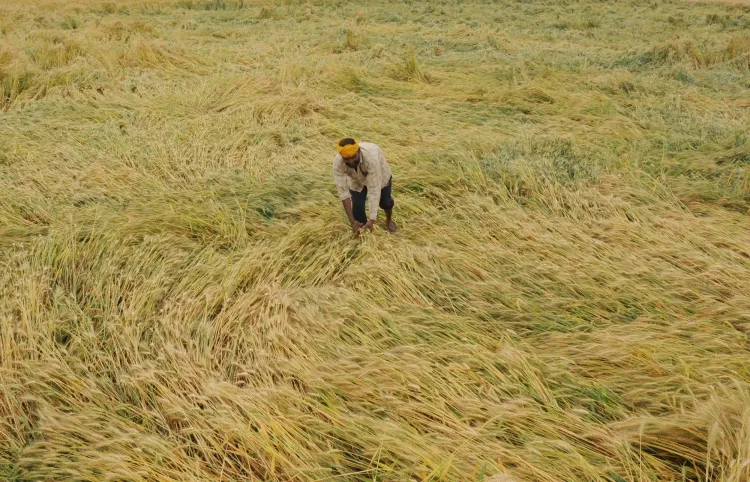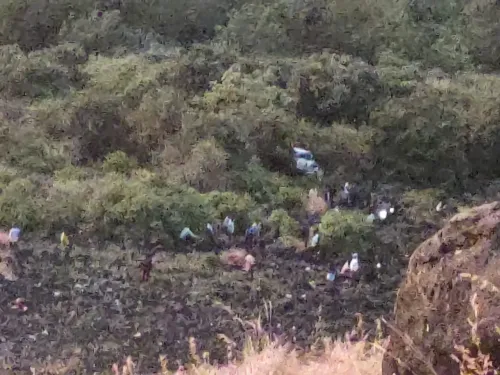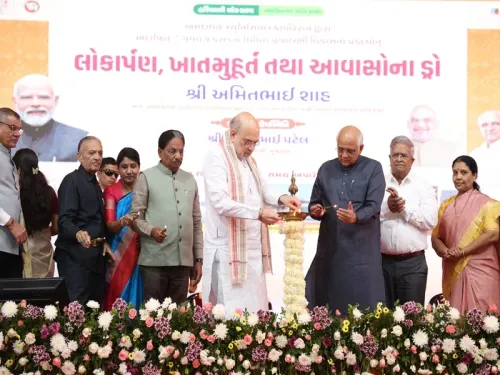Farmers in TN Delta Face High Machine Rental Costs and Crop Losses Due to Unseasonal Rains

Synopsis
Key Takeaways
- High harvesting machine rents are crippling farmers.
- Unseasonal rains have led to extensive crop damage.
- Farmers are demanding a revision of moisture content limits.
- Government support is crucial for recovery and regulation.
- Adequate harvesting machinery is lacking.
Chennai, Jan 27 (NationPress) Farmers in Tamil Nadu’s Delta districts, known as the state’s rice bowl, are currently facing soaring costs associated with harvesting machines, coupled with significant crop damage resulting from unseasonal rains. These issues have severely impacted the region’s Samba paddy farmers, many of whom are now confronting considerable financial losses.
The harvesting season, which commenced in December 2024 and extended into January 2025, has been disrupted due to private operators demanding exorbitant rental fees for harvesting machinery.
The Tamil Nadu Agriculture Department has set the hourly rental price for standard harvester machines at ₹1,160 and ₹1,880 for belt varieties. However, farmers have reported that private operators are charging between ₹3,000 and ₹3,200 per hour, with some rates projected to rise as high as ₹4,000.
Farmers contend that the state’s Agriculture Engineering Department does not possess enough harvesters, compelling them to depend on private operators who are taking advantage of the situation.
During the Kuruvai season, private operators charged ₹2,800 per hour, but these rates have surged significantly, exacerbating the financial strain on farmers.
Leader of the Delta Farmers Association, M.L. Palanisamy, expressed his concerns, stating, “Numerous harvester machines are being transported from other districts and states. It is crucial for district administrations to step in and regulate these rents while providing support to farmers.”
In addition to the high harvesting costs, farmers are also suffering from the repercussions of unseasonal rains, which have caused severe damage to Samba paddy crops across Thanjavur, Tiruvarur, Mayiladuthurai, and Nagapattinam districts.
The northeast monsoon, which typically concludes by December 15, 2024, has persisted into January 2025. Consequently, crops that were ready for harvest have been submerged, leading to elevated moisture levels and fungal infections.
Delta farmers have reported extensive crop losses, with Nagapattinam seeing damage to 30,000 acres of Samba and Thalady paddy, while Mayiladuthurai experienced destruction across 25,000 acres.
In Tiruvarur, 30,000 acres of paddy have been adversely affected, and in Thanjavur, another 25,000 acres were damaged.
Palanisamy lamented, “The crops were in excellent condition, and we were anticipating a nearly normal harvest. It is devastating that unseasonal rains have impacted the crops at this critical time. In many regions, fungal infections have further diminished yields by 50 percent.”
Farmers have invested approximately ₹35,000 per acre into cultivation and are now demanding immediate relief measures.
They have requested the government to increase the moisture content limit from the standard 17 percent to 22 percent, as the unseasonal rains have rendered adherence to the existing standards impossible.
Moreover, farmers have criticized the insufficient desilting efforts, which hindered water drainage from fields, exacerbating crop damage.
Many farmers rely on government-operated Direct Procurement Centres (DPCs) to secure profitable pricing and recoup their production costs.
Delta farmers are calling for thorough governmental support, including an accurate assessment of losses, regulation of harvesting machine rents, and a revision of moisture limits to avert financial disaster.










